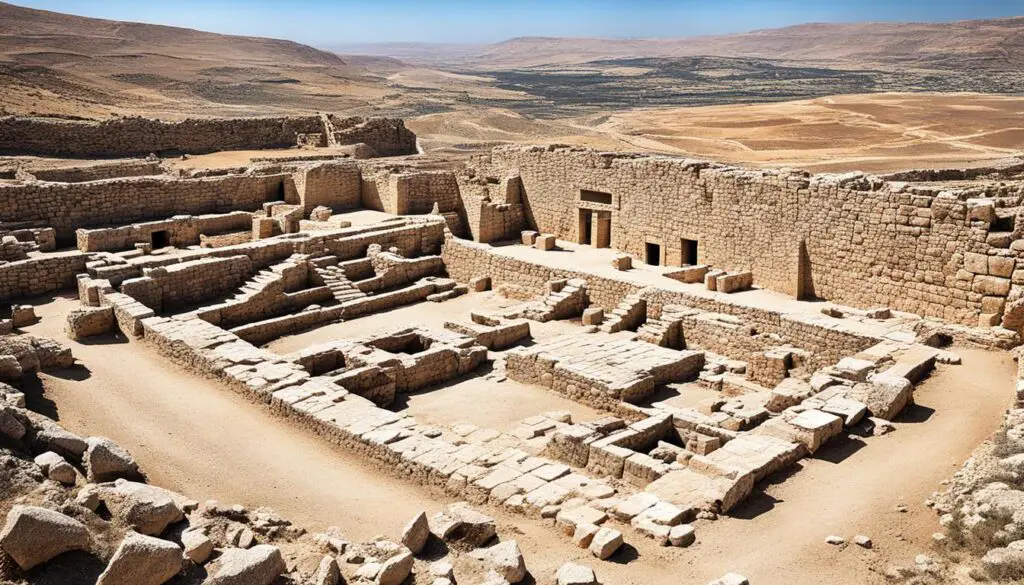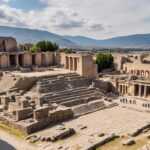When reading the Old Testament, you may come across references to the city of Ai. But what is the meaning of Ai in the Bible, and what is its significance in a biblical context? In this article, we delve into the ancient city of Ai, exploring its historical, geographical, and theological importance.
Key Takeaways:
- Ai is an ancient city mentioned in the Old Testament, particularly in the Book of Joshua.
- Recent archaeological discoveries support the identification of Khirbet el-Maqatir as the biblical Ai.
- Ai holds historical significance in the conquest of Canaan by the Israelites.
- Understanding the geographical location of Ai provides insights into biblical events and narratives.
- The story of Ai raises theological themes of obedience, consequences of sin, and divine justice.
Historical Significance of Ai in the Bible
Ai holds great historical significance in the context of the Old Testament. According to the biblical account in Joshua 7 and 8, Ai was one of the fortified cities that the Israelites conquered during their conquest of Canaan. The story of the conquest of Ai highlights the consequences of disobedience to God’s commands and the importance of faithfulness in carrying out His instructions. It serves as a cautionary tale and a reminder of the Israelites’ dependence on God for victory in their battles.
Geographical Location of Ai
The biblical account of Ai provides several geographical indicators for its location. According to the scriptures, Ai is said to be near Bethel and Beth-Aven, located east of Bethel, and adjacent to a valley.
Scholars have identified Khirbet el-Maqatir as the likely site of Ai, as it aligns with these geographical criteria. Khirbet el-Maqatir is situated near modern-day el-Bireh and Beitin, which correspond to Bethel and Beth-Aven, respectively. The topography of Khirbet el-Maqatir, including a valley and a hill to the north, also matches the biblical description.
The geographical location of Ai near Bethel and Beth-Aven is significant, as it helps us contextualize the events that unfolded in the biblical narrative. Understanding the physical surroundings of Ai adds depth to our understanding of the historical and theological implications of this ancient city.
Geographical Indicators of Ai
| Geographical Indicators | Corresponding Location |
|---|---|
| Near Bethel | Modern-day el-Bireh |
| Near Beth-Aven | Modern-day Beitin |
| Located east of Bethel | Adjacent to el-Bireh |
| Adjacent to a valley | Topography of Khirbet el-Maqatir |
Archaeological Discoveries at Khirbet el-Maqatir
The Associates for Biblical Research conducted excavations at Khirbet el-Maqatir from 1995 to 2017, unearthing several significant archaeological findings. These discoveries provide compelling evidence supporting the identification of Khirbet el-Maqatir as the biblical city of Ai.
Among the remarkable findings at the excavation site are:
- Remains of a fortified settlement dating to the time of Joshua
- Fortified walls surrounding the city
- A main gate facing north
- Evidence of occupation during the 15th century B.C.
- Signs of destruction by fire, consistent with the biblical account
- Presence of pottery, sling stones, and infant burial jars
These discoveries corroborate the biblical narrative and reinforce the authenticity of Khirbet el-Maqatir as the biblical Ai.
Here is an image showcasing the archaeological site:

Theological Themes of Ai in the Bible
The story of Ai in the Bible brings forth thought-provoking theological themes that resonate with believers and offer valuable insights into the divine nature. One prominent theme highlighted in the narrative is the importance of obedience to God’s commands.
Through the account of Ai, we witness the significance of adherence to God’s instructions and the severe consequences of disobedience. When the Israelites disobeyed and violated God’s command regarding the spoils of war in the first battle of Ai, they experienced a devastating defeat.
“For they broke faith in regard to the devoted things, f
Key Biblical Events at Ai
The key biblical events at Ai center around the conquest, defeat, and subsequent victory achieved by Joshua and the Israelites. The first battle of Ai resulted in a defeat for the Israelites due to Achan’s disobedience and the presence of sin within their camp. However, upon discovering Achan’s sin and dealing with it, the Israelites were able to achieve a significant victory in the second battle of Ai.
The events at Ai highlight the significance of purity and obedience in obtaining God’s favor and achieving success in their mission to conquer the promised land. They serve as valuable lessons about the consequences of disobedience and the importance of addressing sin within the community.
“And Joshua sent men from Jericho to Ai, which is beside Beth-aven, on the east side of Bethel, and spoke unto them, saying, Go up and view the country. And the men went up and viewed Ai.” – Joshua 7:2
Following the defeat in the first battle, Joshua sought guidance from God and discovered the reason behind their failure was Achan’s disobedience. After dealing with the sin, the Israelites were able to mount a successful attack on Ai and achieve victory:
“And the Lord said unto Joshua, Fear not, neither be thou dismayed: take all the people of war with thee, and arise, go up to Ai: see, I have given into thy hand the king of Ai, and his people, and his city, and his land.” – Joshua 8:1
These key events at Ai demonstrate the importance of faithfulness to God’s commands and the role of divine intervention in the outcomes of battles. They further emphasize the significant role that Ai played in the Israelites’ conquest of Canaan.
Ai Conquests in the Book of Joshua
To better understand the key events at Ai, let’s examine the two battles in the context of the Book of Joshua:
| Battle | Event |
|---|---|
| First Battle | The Israelites suffer a defeat due to Achan’s disobedience and the presence of sin in their camp. |
| Interlude | Joshua deals with Achan’s sin, restoring obedience and purity among the Israelites. |
| Second Battle | The Israelites successfully attack Ai, achieving a significant victory and fulfilling God’s promise. |
These events demonstrate the significance of Ai as a defining moment in the Israelites’ campaign to conquer the promised land. The conquests and subsequent victories portray the importance of obedience and purity in securing God’s favor and achieving success.
Cultural and Religious Practices at Ai
The Canaanite city of Ai was characterized by a rich tapestry of cultural and religious practices. Although the precise details of these practices are not mentioned in the biblical account, we can infer that Ai, like other Canaanite cities, had its own unique customs, rituals, and religious beliefs.
“Culturally and religiously, Ai would have been a vibrant center of Canaanite tradition and worship,” says Dr. Rachel Cohen, an expert in ancient Near Eastern civilizations. “These practices would have shaped the daily lives of its inhabitants, informing their social interactions, ceremonies, and spiritual beliefs.”
While concrete archaeological evidence is limited, the study of neighboring Canaanite cities provides valuable insights into the broader cultural context of Ai. Canaanite religious practices often revolved around the worship of gods and goddesses associated with nature, fertility, and agriculture.
“The Canaanites held a pantheon of deities, including Baal, the storm god, and Asherah, the mother goddess,” explains Dr. Cohen. “Canaanite worship involved rituals, sacrifices, and ceremonies to appease and seek favor from these deities.”
These cultural and religious practices likely influenced the resistance encountered by the Israelites during their conquest of Ai. The Israelites, led by Joshua, were encountering a deeply rooted Canaanite culture with long-standing traditions and religious beliefs.

The cultural and religious landscape of Ai underscores the significance of the Israelites’ victory and the impact it had on the broader region. By understanding the cultural practices of Ai, we gain valuable insight into the diversity and complexity of Canaanite society during this period of history.
Prophetic and Eschatological Significance of Ai
The ancient city of Ai holds profound prophetic and eschatological significance in biblical narratives. Its portrayal as a symbol of conquest and victory foreshadows the ultimate triumph of God’s people over their enemies, pointing to the final battle between good and evil and the decisive victory of Christ.
The conquest of Ai serves as a powerful reminder of God’s faithfulness and His fulfillment of His promises. Just as the Israelites experienced victory over Ai through their obedience to God’s commands, believers are encouraged to remain faithful and trust in God’s deliverance in the midst of trials and challenges.
This understanding of Ai in a prophetic and eschatological context adds a deeper spiritual significance to the biblical account. It highlights the divine plan for redemption, emphasizing the ultimate victory of God’s kingdom over the forces of darkness.

“And Ai, the king thereof, he hanged on a tree until eventide: and as soon as the sun was down, Joshua commanded that they should take his carcass down from the tree.” – Joshua 8:29
Through Ai, we are reminded of the prophetic promises and the eschatological hope that believers hold dear. The conquest of Ai provides a glimpse into the glorious future when evil will be fully defeated and God’s righteousness will prevail.
The Significance of Ai in the Biblical Context
Ai plays a crucial role in the biblical context, particularly in the conquest of Canaan by the Israelites. This ancient city holds immense significance as it embodies important themes such as obedience, the consequences of sin, divine justice, and restoration. The biblical account in the Old Testament reveals the profound theological implications associated with Ai.
The identification of Khirbet el-Maqatir as the probable location of Ai through archaeological discoveries further bolsters the historical accuracy of the biblical narrative. These findings provide tangible evidence of the events described in the Old Testament, lending credibility to the accounts of the conquest of Canaan.
Understanding the significance of Ai enriches our understanding of the Old Testament narrative and its theological implications. It allows us to delve deeper into the historical and cultural context of the Israelites’ journey and their interactions with neighboring civilizations in their pursuit of claiming the Promised Land.
“The exploration of Ai in the Bible reveals the intricate tapestry of obedience, consequence, divine justice, and restoration, weaving a narrative that resonates with believers to this day.”
The Biblical Theme of Obedience
Ai serves as a striking example of the biblical theme of obedience to God’s commands. The initial defeat of the Israelites in the first battle of Ai was attributed to the presence of sin and disobedience within their midst. The subsequent victory in the second battle of Ai affirms the importance of obedience and symbolizes the restoration of God’s favor.
The Consequences of Sin and Divine Justice
The story of Ai vividly depicts the consequences of sin and the role of divine justice. Achan’s disobedience resulted in the defeat of the Israelites in their first encounter with Ai, highlighting the importance of addressing sin within the community. The subsequent judgment and punishment, followed by the eventual victory, underscore God’s commitment to justice and his faithfulness to His covenant with His people.
Restoration and God’s Faithfulness
Ai exemplifies the theme of restoration and God’s faithfulness. The defeat and subsequent victory in Ai showcase God’s unwavering commitment to His people and His restorative power when obedience is restored. The narrative of Ai serves as a reminder of the covenant relationship between God and the Israelites, emphasizing the importance of fidelity and dependence on God in times of trial.
| Themes | Key Ideas |
|---|---|
| Obedience | The consequences of disobedience and the restoration of God’s favor through obedience |
| Divine Justice | The role of divine justice in the defeat and victory at Ai |
| Restoration | The restoration of God’s favor and faithfulness to His covenant |
Understanding the significance of Ai in the biblical context deepens our understanding of the Old Testament narrative and its enduring theological message. The exploration of Ai reveals profound insights into obedience, consequences, justice, and restoration, reminding us of the timeless lessons that can be gleaned from these ancient accounts.

Conclusion
The archaeological evidence and historical research presented in this article provide conclusive evidence supporting the identification of Khirbet el-Maqatir as the biblical city of Ai. Through meticulous excavation and careful analysis, scholars have discovered compelling correspondences between the biblical account and the found evidence at the site.
This archaeological confirmation adds credibility to the historical reliability of the biblical narrative. It reinforces the importance of archaeological research in gaining insights into the biblical world and deepening our understanding of the Old Testament. The exploration of Ai in the Bible has not only shed light on its historical significance but also provided valuable insights into biblical history, theology, and the cultural practices of the time.
By uncovering the truth about Ai, archaeology has given us a clearer understanding of the events and people mentioned in the Bible. It allows us to connect with the past, validating the ancient texts and enriching our faith. The identification of Khirbet el-Maqatir as Ai is a significant milestone in bridging the gap between the biblical account and the archaeological record, reinforcing the authenticity and relevance of the Bible in the process.







